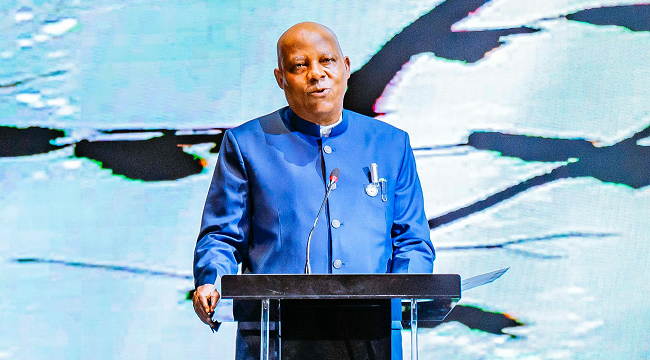The Federal Government has commenced high-level engagements with international financial institutions to secure over $60 million in climate finance, aimed at launching pilot green energy hubs across the country. A major component of the initiative includes a hybrid energy system for one of Nigeria’s key airports, envisioned as a prototype for clean and digitally monitored energy solutions across critical public infrastructure.
Vice President Kashim Shettima made this disclosure at the opening of the Decarbonizing Infrastructure in Nigeria Summit held at the State House Conference Centre in Abuja. The summit focused on mobilising climate finance and accelerating Nigeria’s transition to sustainable infrastructure.
“We can no longer delay. Climate action is not just about protecting the environment—it is an economic necessity,” Shettima said. He warned that inaction in the face of growing climate threats could jeopardise the nation’s development and long-term economic viability.

According to Shettima, over 75 percent of Nigeria’s greenhouse gas emissions stem from infrastructure-heavy sectors such as energy, transportation, agriculture, and urban development. With the population projected to reach over 440 million by 2050, the Vice President stressed that without decisive intervention, resource pressures and environmental degradation would intensify.
“To decarbonise is to invest in Nigeria’s prosperity,” he asserted, adding that the green energy hubs would be a critical step toward reducing emissions while supporting inclusive growth.
The Vice President outlined several federal initiatives that align with the national climate goals, including the rollout of regional climate engagement clinics, a State Innovation Challenge Park, and the upcoming release of a white paper on green growth financing. These efforts, he said, are designed to build climate resilience while driving innovation and local participation.
“Our transition must reach every state, every community, and every home,” Shettima said, highlighting the need for inclusive planning and decentralised implementation of green initiatives.
He also called for harmonised policies across federal, state, and local governments, and urged the adoption of innovative financing instruments such as green bonds and climate investment funds to scale local solutions and technologies.
“Our goal is net-zero,” he declared. “But the journey must begin now—with urgency, inclusion, and bold action.”
The planned $60 million investment, if secured, would mark a significant shift toward clean energy infrastructure, aligning Nigeria with global sustainability trends while addressing its domestic energy and climate adaptation challenges.



